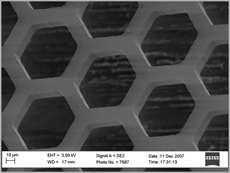RPA - Rapid Pathogen Analyzer
This project aims at developing an integrated, highly sensitive diagnostic technology allowing quantitative identification of pathogens in air/aerosol, from breath of an individual or in the environmental air, to define carriers of pathogens before clinical outbreak. The project develops and integrates the entire chain of techniques needed to incorporate the diagnostic test in a portable device, with functions ranging from automated airborne sample collection to electronic readout signal.

Infectious diseases require in most cases rapid diagnosis and urgent treatment. Thus, life threatening, acute infections would greatly benefit from a close to instantaneous diagnosis such as for many viral diseases including respiratory or gastrointestinal infections caused by i.e. influenza, calicirus or respiratory syncytical virus infections. An integrated, highly sensitive diagnostic technology allowing quantitative identification of pathogens in air/aerosol could also define carriers of pathogens before clinical outbreak, a significant problem in immunosuppressed patients. This project has the potential to enrich and detect small amounts of pathogens in air/aerosol, from breath of an individual or in the air. This would mean a most significant improvement compared to present state-of-art of identification in pathogens in these diseases.

The work is conducted as a cross disciplinary effort where groups at Karolinska Institute, Linköping University (pathogen and immunoassay expertise) and KTH (microsystem technology and microfluidics expertise). The challenge of this project lies in the achievement of sufficient sensitivity and selectivity in a miniaturized system combining previous recent results in QCM based detection and fluidics technology with a selective pathogen detection.

Project sponsors:
- Vetenskapsrådet, Vinnova, SSF
Project partners:
- Karolinska Institute, Hans Wigzell
- Linköping University, Lennart Svensson
Project members:
Thomas Frisk
Publications related to this project
- Integrating Biosensors for Air Monitoring and Breath-Based Diagnostics
- Integration of a QCM with an OSTE cartridge
- ONE STEP INTEGRATION OF GOLD COATED SENSORS WITH OSTE POLYMER CARTRIDGES BY LOW TEMPERATURE DRY BONDING
- Electrohydrodynamic Enhanced Transport and Trapping of Airborne Particles to a Microfluidic Air-Liquid Interface
- Microsystems for Airborne Sample Detection
- ELECTROHYDRODYNAMIC ENHANCED TRANSPORT AND TRAPPING OF AIRBORNE PARTICLES TO A MICROFLUIDIC AIR-LIQUID INTERFACE
- A miniaturised QCM-based integrated electronic nose system
